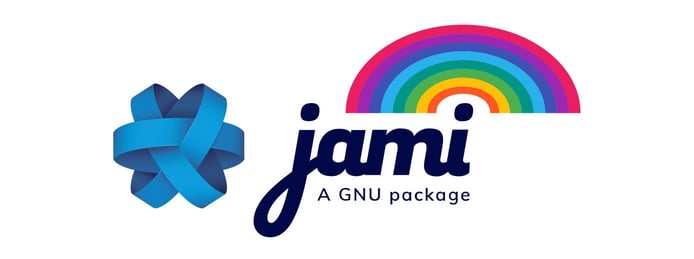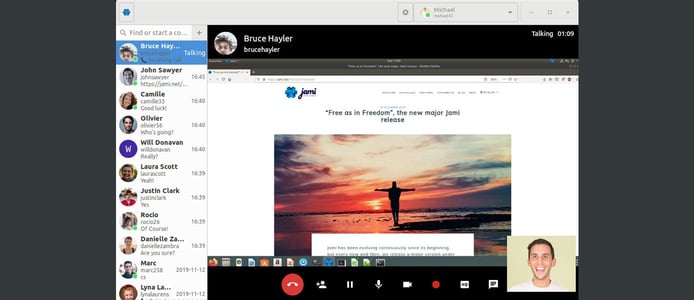
TL; DR: Jami’s free, open-source communication platform allows users to connect via chat, phone, and video while maintaining privacy and security using a peer-to-peer network and powerful encryption. Its latest release, Free as in Freedom, provides several new features, including a dark theme, group calls, audio and video messages, and screen sharing. With plans to create a unified communication system for organizations, Jami is working to facilitate the future of online correspondence.
The ongoing coronavirus pandemic has remote workers across the globe flocking to the video conferencing application Zoom.
But recent security breaches such as the Zoombombing phenomenon — in which intruders hijack sessions with a barrage of inappropriate content — are causing many users to bolt.
Instead, they’re turning to open-source communication solutions, such as Jami. The platform allows users to connect via chat, phone, and video while maintaining privacy and security. The cloudless peer-to-peer platform features end-to-end encryption and enables users to join without sharing personal information or dealing with an intermediary.

Jami’s peer-to-peer solution allows users to securely and privately connect via chat, phone, and video.
“After the Zoom issues, there were so many concerns about privacy that people began to investigate more secure solutions,” Christophe Villemer, Advocacy Vice President at Jami, said. “In the process, we gained a lot of visibility. In March and April, downloads increased by 500%.”
Christophe told us that since Jami is mainly used for one-on-one communication and small conference calls, it’s not competing directly with Zoom. But the open-source solution is a perfect alternative for professionals like doctors and lawyers, who need to protect their online consultations with the strongest security measures available.
And, because users can use Jami for messaging, audio and video calls, and screen sharing, it can also provide a secure alternative for instant messaging and voice over IP apps like Telegram and Skype.
Jami is a GNU project distributed under a GPLv3 license and backed by the Free Software Foundation, which works to promote open-source software and online freedom. Moving forward, the Jami team plans to create a unified communication system for organizations that will help facilitate the future of online correspondence.
Savoir-faire Linux: Promoting Open-Source Software and Online Freedom
Jami is a spinoff of Savoir-faire Linux, which was founded in 1999 in Québec to provide specialized open-source software engineering services. The R&D-focused company is widely known for its SFLPhone, an open-source softphone designed for Linux that could manage an unlimited number of calls and lines.
Christophe told us the infamous 2013 Snowden leaks help increase public awareness of mass surveillance in the U.S. and beyond, reinforcing the need for privacy protection online.
“At the time, the Free Software Foundation asked the open-source community to work on new tools that would ensure that privacy could be sustained independent of companies like Google and Microsoft,” he said. “We’ve always been focused on R&D, especially in video and audio, so we decided to develop a disruptive peer-to-peer communication platform.”

Savoir-faire Linux developed Jami to provide privacy in a post-Snowden era.
Savoir-faire Linux worked with local universities in Montréal to overcome technical challenges for four years. The result was Ring, which took the SFLPhone to the next level by replacing its centralized service with the same protocol used in BitTorrent to facilitate connections.
To avoid confusion with Amazon’s Ring Video Doorbell, the team changed the product’s name to Jami. The new name, inspired by a Swahili word that means community, was announced ahead of CES 2019 in Las Vegas.
Since then, Jami’s open-source community has supported the project with bug reports, patches and code reviews, and user interface translations (Jami is being translated into 86 languages, including English, Spanish, French, German, Italian, Chinese, Russian, and Albanian).
Jami’s Latest, Feature-Packed Release: Free as in Freedom
In November 2019, Jami introduced its latest major release, dubbed Free as in Freedom.
“Jami is a game-changer for the communication app market,” said Cyrille Béraud, President of Savoir-faire Linux, in a press release. “Its cloudless architecture provides unmatched levels of privacy and virtually eliminates infrastructure costs, allowing us to provide it for free without restriction and without monetizing end-users’ data or attention. The new version, ‘Free as in Freedom,’ was chosen to reflect Savoir-faire Linux’s core value of developing free and open-source software.”
The latest edition of Jami contains multiple new features. One of the biggest changes is the addition of video conferencing for all platforms. Since Jami doesn’t rely on centralized servers, each conference is hosted by the person who initiates it. Therefore, the maximum number of participants depends on the computing power and available bandwidth of the host.

The Jami team uses Free as in Freedom to communicate during the COVID-19 pandemic.
The Free as in Freedom edition also allows users to record and send audio and video messages. In addition, users with 4K cameras can now take advantage of high-resolution video calling, which is useful if the recipient has a 4K screen.
During a video call, users can also share sections or the entire portion of their screens. A dark theme is also available on macOS, Linux, and Android that reduces both energy consumption and eye strain.
Moving forward, Christophe told us that Savoir-faire Linux is working with hospitals in the U.S. to help patients communicate with their families securely using iPads. “We are developing some management tools that make it possible to put a set of Jami users into an organization,” he said.
Facilitating the Future of Online Correspondence
Christophe said he sees distributed communication platforms replacing their centralized counterparts down the road to ensure privacy and increase sustainability.
“Datacenters are becoming more and more crowded,” he said. “They require a lot of energy, making their environmental impact pretty significant. When you’re running a video conference on servers, you increase both environmental impact and costs.”
Christophe told us he thinks that’s one of the reasons that few people are using the free video calling app Google Duo.
“Duo is a very good solution, but Google never really publicized it because it’s just a cost for them,” he said. “Businesses want to get a reward for their free software, and that’s usually accomplished by collecting users’ personal data.”
Because Jami’s distributed communications solution is not dependent on datacenters, the platform can scale without added costs. “That’s why we think decentralized communication platforms are surely the way of the future,” Christophe said.
To keep the business up and running, Savoir-faire Linux uses the skills the team has gathered in the blockchain and distributed services space to provide digital consultancy.
Creating a Unified Communication System for Organizations
As a distributed network, Jami will remain free indefinitely. Moving forward, Savoir-faire Linux will also provide a commercial solution for organizations that wish to have some level of control over their users.
The service, known as Jami Account Management Server (JAMS), is currently available for alpha testing but not ready for formal use. Thus far, features include a single sign-on, integration with internal employee registries, the ability to generate and revoke unlimited accounts and devices, and a central dashboard.
“We are on our way to helping organizations use Jami as a communications tool through local directories that we call JAMS,” Christophe said. “We are working on a few proofs of concepts in the U.S., and can’t wait to introduce the first organization to use Jami professionally. We are going to officially launch JAMS this summer (supported edition and professionals services packages), and make it available through an online store.”
HostingAdvice.com is a free online resource that offers valuable content and comparison services to users. To keep this resource 100% free, we receive compensation from many of the offers listed on the site. Along with key review factors, this compensation may impact how and where products appear across the site (including, for example, the order in which they appear). HostingAdvice.com does not include the entire universe of available offers. Editorial opinions expressed on the site are strictly our own and are not provided, endorsed, or approved by advertisers.
Our site is committed to publishing independent, accurate content guided by strict editorial guidelines. Before articles and reviews are published on our site, they undergo a thorough review process performed by a team of independent editors and subject-matter experts to ensure the content’s accuracy, timeliness, and impartiality. Our editorial team is separate and independent of our site’s advertisers, and the opinions they express on our site are their own. To read more about our team members and their editorial backgrounds, please visit our site’s About page.

